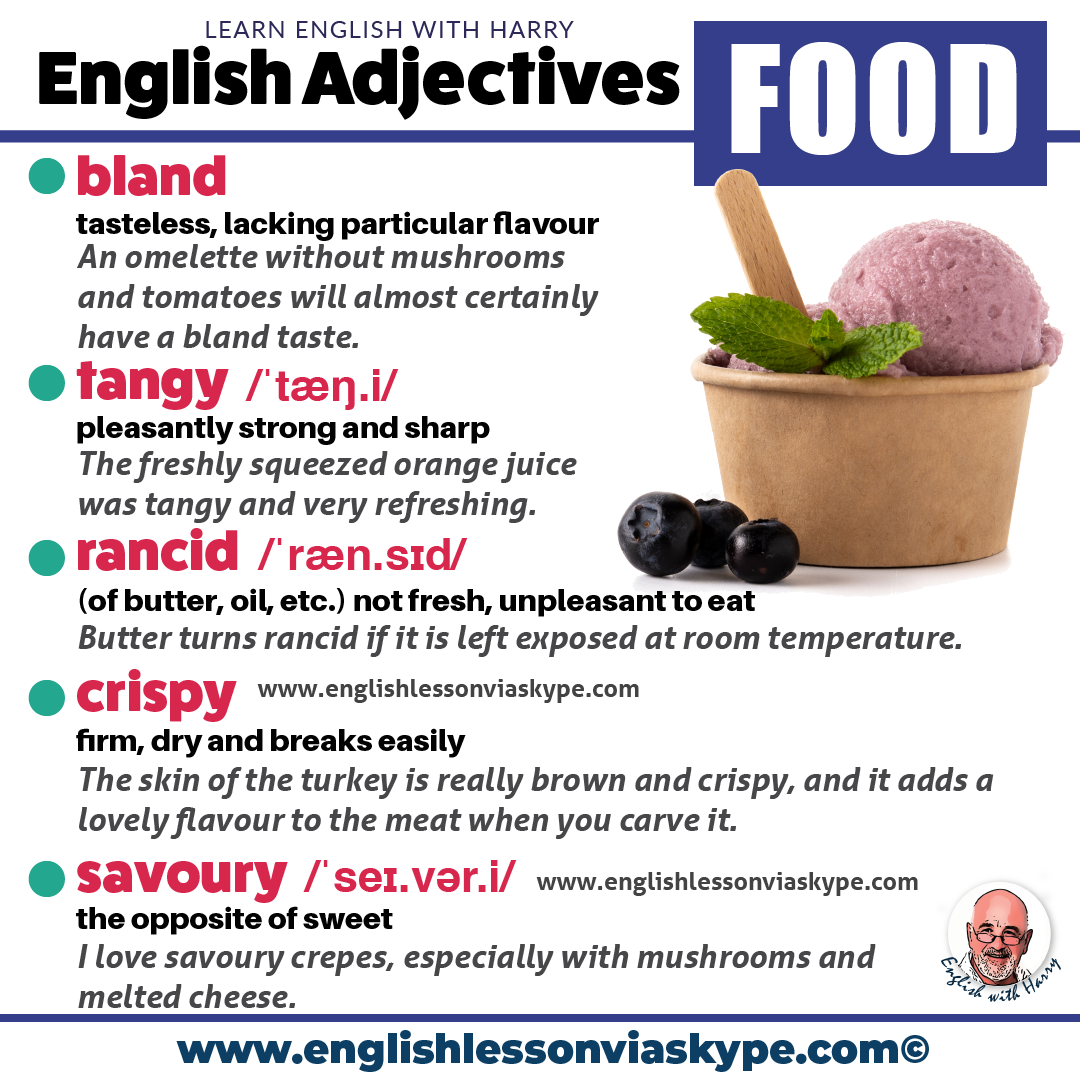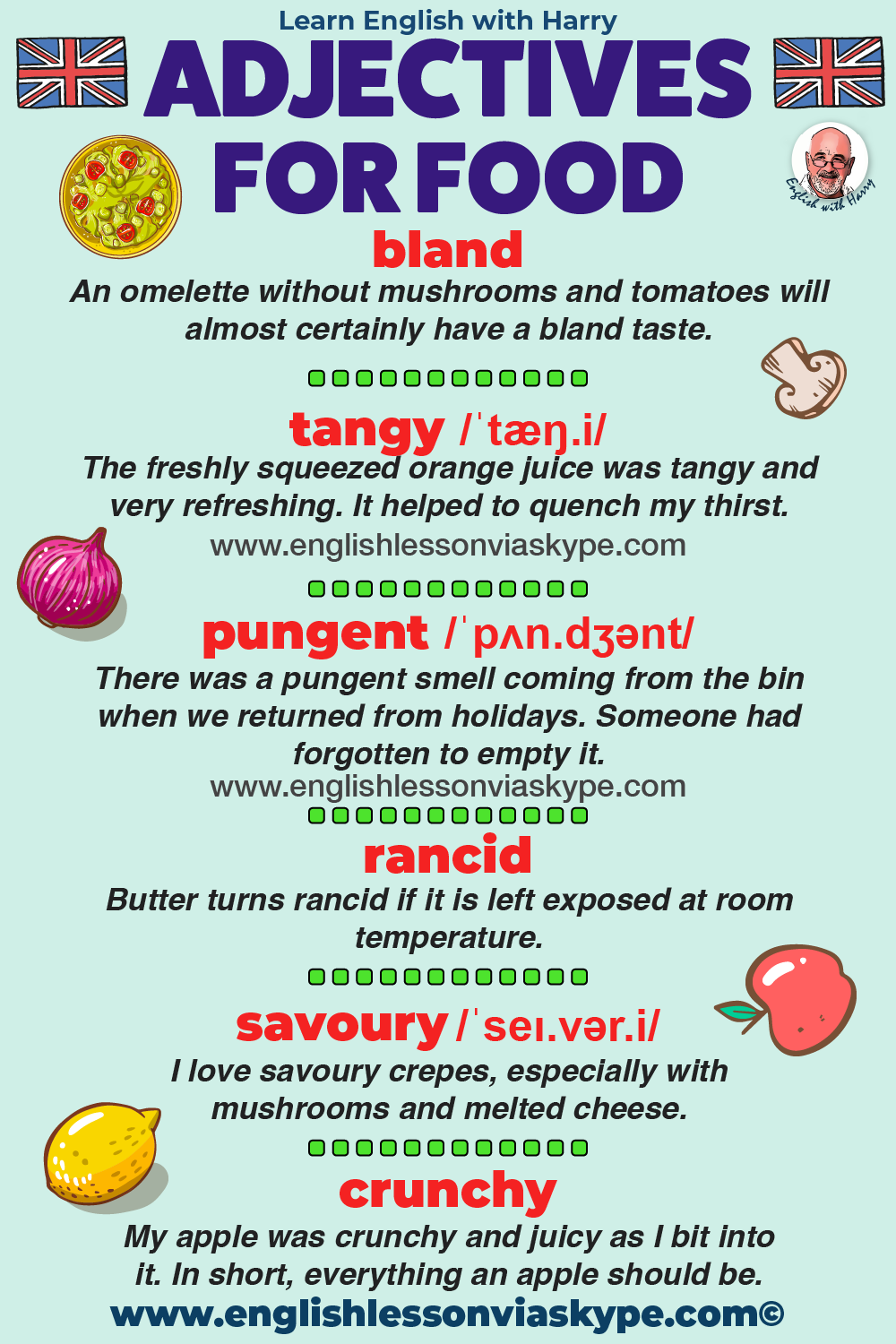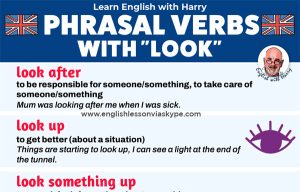Learn English adjectives to describe food. This lesson includes 13 advanced English adjectives to help you expand your vocabulary, improve your pronunciation and express yourself in better ways.
This lesson is great for intermediate and advanced English language learners who are learning vocabulary and adjectives about describing food.
Upgrade your English vocabulary and stop using the same words over and over again.
Listen to the podcast Speak Better English with Harry or watch it on YouTube at Learn English with Harry. englishclass101
English vocabulary for food
Adjectives To Describe Food In English
Harry
The lesson today is all about food. But it’s advanced English adjectives that we use to describe food, okay. So it’s not a food lesson as such. I’m not going to talk about recipes, you’ll be very glad to hear I’m not even going to tell you what to cook. So it’s only about food.
It’s an advanced English lesson with adjectives connected with foods. So we’ve got 13 particular adjectives that we will use. And in some cases, they may sound similar, you might have some words that you’ve heard before, but a lot of them you may not, and we use them to describe particular smells or particular tastes.
And at the end of this particular lesson, I’m also going to give you a few specific words that we use only to describe certain types of foods, and it’s really, really important to understand those.
improve english on a budget
Online English Courses from €7.99
bland
Meaning: tasteless, lacking particular flavour
Example:
An omelette without mushrooms and tomatoes will almost certainly have a bland taste.
insipid
Meaning: (more formal) something with zero taste
Example:
Tea is a drink that I find very insipid. I really just don’t like it. You might as well be drinking hot water.
tangy
Meaning: pleasantly strong and sharp
Example:
The freshly squeezed orange juice was tangy and very refreshing. It helped to quench my thirst.
pungent
Meaning: really strong and sharp, affects the nose
Example:
There was a pungent smell coming from the bin when we returned from holidays. Someone had forgotten to empty it.
Adjectives To Describe Food In English

stale
Meaning: hard, not pleasant for you to eat
Example:
We used to soak stale bread in water and take it to the parks to feed the ducks.
rancid
Meaning: (of butter, oil, etc.) not fresh, unpleasant to eat
Example:
Butter turns rancid if it is left exposed at room temperature.
stodgy
Meaning: heavy and often unhealthy
Examples:
Many people in Northern Europe tend to eat more stodgy food because of the cold, wet weather we experience.
A big plate of porridge is a nice breakfast in wintertime, but it can be a little bit stodgy.
book your trial English Lesson
chewy
Meaning: like eating the sole of your shoe
Example:
The meat has been overcooked; it is really chewy. I can hardly cut it with a knife.
gooey
Meaning: melty, drippy and soft
Examples:
Ugh, my toastie was so good. The cheese was gooey, and it just tasted like heaven.
Gooey cheese fondue is a popular winter dish in Switzerland.
crispy
Meaning: firm, dry and breaks easily
Examples:
The skin of the turkey is really brown and crispy, and it adds a lovely flavour to the meat when you carve it.
I usually order a burger with cheese and crispy bacon.
crunchy
Meaning: hard, making a loud sound when chewed
Examples:
My apple was crunchy and juicy as I bit into it. In short, everything an apple should be.
Dried dog food is crunchy, which is great for helping with their teeth and gum health.
savoury
Meaning: the opposite of sweet
Example:
I love savoury crepes, especially with mushrooms and melty cheese.
Adjectives To Describe Food In English

mouldy
Meaning: covered with black, green or grey growth
Example:
Different types of cheeses are sold as mouldy cheese.
Okay, so they are all adjectives to describe food in English. Let me give them to you one more time:
- bland
- insipid
- tangy
- pungent
- stale
- rancid
- stodgy
- chewy
- gooey
- crispy
- crunchy
- savoury
- mouldy
Now, I did promise that I would also give you some specific words relating to specific foods and these words. Be really careful, we only use them in connection with these particular foods.
stale
- stale bread
- stale cake
- stale biscuits
❌ stale banana
rancid
- rancid oil
- rancid butter
❌ rancid banana
❌ rancid meat
sour
- sour milk
- sour cream
- sour soup
❌ sour cheese
rotten
- rotten meat
- rotten eggs
- rotten banana
❌ rotten bread
Okay, so there are all advanced English adjectives connected with food and those particular words, those four words that I’ve just given you there – stale, sour, rancid and rotten – are only used with specific food types.
Okay, so you know the drill by now. You need to practice these, you need to look at them, and you need to listen to them once or twice. If you have any problems, you come back to me, and I’ll give you some more examples.
Check out online English lessons with native teachers and book your trial lesson.
As always, I really really appreciate you watching and listening. Join me again soon. Harry’s saying goodbye.
speak better English with Harry podcast- episode 409
more information
For more information on English grammar rules, English collocations and English idioms, check out the links below:
How to accept and decline invitations
You can always study English advanced level at Learning English with the BBC and British Council Learn English.
You will love these English lessons

Less Well Known Phrasal Verbs with OFF
Here are I have 13 English phrasal verbs with OFF for you. Most people when looking at such phrasal verbs


English Phrasal Verbs with LOOK
Phrasal verbs with look. Learn English vocabulary. Online English lessons on Zoom and Skype.


Talk about Transport in English
Transport and the ways we use it in our daily lives captures the attention of all of us. I thought

